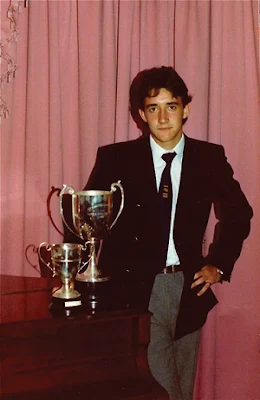Back in 2019, American multinational investment bank and financial services company Goldman Sachs purchased United Capital for $750 million in cash — a wealth management company founded in 2005 by Joe Duran who grew up in Harare, Zimbabwe in the '70s. As the founder and CEO of United Capital, Duran grew his business to $25 billion in managed assets and served 220 financial advisors across 95 offices by 2019.
Duran's upbringing took place in war-affected Rhodesia, now Zimbabwe, he attended his High School at Oriel Boys' High School and he moved to the United States at 18 years old with only $200 in his possession. He attributes his background to his focus on the broader perspective of investment. "A majority of investing is a mental challenge; you cannot control the market's actions," Joe Duran remarked in an interview with Yahoo.
He established United Capital a few years after his previous investment firm was acquired by the financial division of General Electric Co. Duran was born in Barcelona to a Spanish mother and an American father. The family relocated to London, then Johannesburg, and eventually settled in a suburb of what is now Harare, Zimbabwe, during the mid-1970s, when it was known as Salisbury, Rhodesia. At the time — amid a civil war — a Woolworth's store was bombed in Salisbury in August 1977, shortly before Duran turned 10. "Tensions were escalating. I recall having to travel to school in convoys," he recollected. “We had neighbours where we lived where their whole family was massacred,” Duran says in an interview with Wealth Management. “They were just found dead, all of them, in a pile in the living room.”
Around the age of 10 or 11, Duran initiated his initial business endeavour. His parents had acquired an auction house that primarily sold belongings on behalf of expatriates departing Rhodesia due to the conflict. Auctions occurred every Friday evening, and since there were no nearby restaurants, Duran established a hot dog stand. "Although I charged an excessive amount, I ensured the aroma was enticing, enticing everyone to desire one."
Duran, driven in part by visions of riches portrayed in American television shows like “Dallas,” was determined to work hard enough to leave Zimbabwe. He took odd jobs throughout high school, from DJ gigs, selling hot dogs, farming a small plot of land, working as a night manager of a clothing factory and as a boat mechanic.
Upon turning 18, Duran left home and used savings from DJ gigs and his role as a night manager at a clothing factory to journey from Harare to London, where he promptly experienced a mugging on his third day there. Duran lost his passport, clothes and money. He was left with 36 pence in his pocket. After spending a night in a train station restroom, he secured a job at a youth hostel. His travels began in Europe and extended to the United States, where he engaged in bartending and various odd jobs.
 |
| Duran with rugby trophy at Oriel Boys’ High School in Zimbabwe, 1987 |
He eventually enrolled at St. Louis University, mainly due to its campus in Spain, where he pursued marketing studies. Later, he added finance as a second major. "I sought something concrete, and since I disliked accounting, I settled on finance. It appeared to offer genuine value." During his studies at St. Louis University's Madrid campus, he encountered his future wife, Jen, who was also studying abroad. Their interactions continued for four consecutive nights, and when she asked for his number, he provided his friend's, as his friend had noticed her first. She amusingly shares this tale with their daughters, highlighting his apparent lack of interest.
Jen, raised in Beverly Hills, had familial ties to the local finance industry, which facilitated Joe's entry into his first finance position: a minimum-wage role compiling spreadsheets for a small investment advisory firm in Sherman Oaks. Duran discovered a talent for promoting the firm's services. "It was simpler than selling ashtrays and old guitars like when I was 11. I'd contact brokers and say, 'Let's meet.' That was it." Over time, he ascended to the presidency of the company, Centurion Capital Management, which GE Financial's division acquired in 2001. At the time of the sale, Duran held about 15% ownership of Centurion, yielding him millions of dollars.
However, the windfall did not bring him contentment. "While I always believed it wasn't about money, deep down, you tend to think it is. I felt a complete loss of identity. Your transition from being a big shot with numerous employees to suddenly being someone with ample funds sipping coffee at Starbucks in the morning." says Durant in an interview published by LA Times. The ensuing years saw him write an entrepreneurship book, "Start It, Sell It, and Make a Mint," while concurrently earning a joint MBA from UC Berkeley and Columbia. In 2005, he established United Capital.
Duran's vision for United Capital was distinctive — a firm that guided clients not only in managing their finances but also in aligning their financial decisions with their objectives. The company employs exercises and online tools to assist clients in devising investment and spending plans, helping them determine whether their financial choices are primarily driven by fear, happiness, or commitment — their "money mindset." Although these tools were initially exclusive to United Capital clients, the firm now offers them to other advisors. Duran envisions that selling these tools will comprise the majority of his business in the coming years. "Within the next five years, around three-quarters of our business will be white-labelled."
*Story compiled from various online sources.
Support Greedysouth by buying the team a cup of coffee. Your support assists in the production of such quality reports. Thank you.
